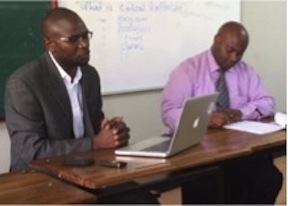 Guest Post by *Hikabwa Chipande
Guest Post by *Hikabwa Chipande
LUSAKA—On June 4, 2014, I was invited by Dr. Walima Kalusa, the University of Zambia’s History Department head, to present a fútbological paper based on my current doctoral research on the political and social history of football in Zambia (1940s-1993). The seminar on “Football and Social Change on the Northern Rhodesian Copperbelt, 1940s to 1960s” was well attended by UNZA History staff, graduate students, and other interested scholars.
I explored how urbanized African miners appropriated football from their European supervisors and, after World War II, created a new black popular culture. When colonial authorities and mining companies introduced post-War social welfare programs to appease miners and urban residents, local Africans used these structures to demand greater access to resources for organized football and other amenities in their communities. In the late 1940s and into the 1950s, Africans popularized the game on the Copperbelt and used it to build vibrant social networks and communities to replace what they left in their rural villages.
As early as 1937, the British had established the Central Native Committee, which seized control of African sport due to fears that the colonized might use football as a tool for political agitation. Despite these moves, ordinary African athletes, officials, and fans developed alternative ways of organizing and enjoying their football. For example, supporters clubs formed. These hard-core fans unexpectedly made club officials and mine managers more accountable to the people. The emerging vernacular fan culture, which no scholar has ever researched before, shows how Zambians were sometimes able to use sport to rework the application of harsh colonial policies.
Another aspect of the history of Zambian football that has eluded researchers has to do with international matches played in colonial times. As I have discovered, Copperbelt teams played in the Belgian Congo, Southern Rhodesia (Zimbabwe), and South Africa. My work illustrates how these sporting adventures, among other things, turned into incubators for Pan-Africanism because the camaraderie experienced by Zambians in these contests sharpened their sense of solidarity with fellow Africans in neighboring colonies.
The seminar audience at UNZA engaged deeply with my work through questions and insightful and constructive comments. Dr. Walima Kalusa noted that while the colonialists intended to use football as a tool for controlling Africans, the main reason why African miners on the Copperbelt appropriated the game was enjoyment and this is an important element that scholars should highlight.
Prof. Musambachime observed that scholarship on football on the Zambian Copperbelt is welcome because it marks an important break from scholarly works that have traditionally focused on workers and trade unions. He stressed how my research will enrich the historiography of the Copperbelt by bringing out how leisure (and football specifically) assumed an important role in the lives of African miners. Dr. Webby Kalikiti, a labor historian, echoed Prof. Musambachime’s remarks: “The paper is groundbreaking. Having something as concentrated and as focused as this work greatly deepens our understanding of labor issues on the Copperbelt,” he said. Dr. Kalikiti encouraged his graduate students who are looking at Copperbelt labor history to closely read the paper and use it as a reference in their work.
A number of participants shared nostalgic reflections on the joy of playing football in boyhood. Professor Mwelwa Musamabachime recalled playing on the Copperbelt in the early 1960s. Mr. Mulenga remembered how exciting it was to score a goal because there was a chance that all the girls watching the match would come and pile-up on top of you to celebrate the goal. Others thought back to how some boys would walk with a limp, faking an injury just to prove they were footballers.
Players were superstars, it was said; respected and admired in communities. Social honor had some tangible benefits, some in the audience noted, like fans buying them beers whenever they walked into a bar. These recollections reminded me of the findings of U.S. anthropologist Hortense Powdermaker, who wrote a fine book titled Copper Town: Changing Africa, The Human Situation on the Rhodesian Copperbelt (1962). A football match in Luanshya in the 1950s, Powdermarker observed, was “an occasion for showing off; often a player pirouetted with the ball, with an obvious eye to the impression he was making on the audience, particularly the females in it” (p.107).
Prof. Musambachime pointed out that while the Copperbelt was indeed the hub of Zambian football, the game also has a long and interesting history in other, even remote, parts of the country. He remembers watching competitive matches in the 1960s in rural towns such as Samfya in Lusapula Province where clubs like Samfya Rockets held sway thanks to the performances of idolized stars. I hope that my seminar helped to lay a good foundation for future scholars to explore the rich and largely undocumented history of football and social change in south-central Africa.
*Hikabwa Chipande is a PhD candidate in African History at Michigan State University. He is a recipient of the FIFA Havelange Research Scholarship for ongoing doctoral research on the social and political history of football in Zambia, 1950-1993. Follow him on Twitter at @HikabwaChipande
Categories
One reply on “Zambian Fútbology”
Congratulations, Hikabwa, on what sounds like a successful and thought-provoking conversation. Work like yours is going to push the historiography of sport in Zambia forward by leaps and bounds. It’s also going to signal the need for a fundamental rethinking of the historiographical approach that scholars have taken towards Zambia. By repositioning the perspective from trade unions and politics to how Africans appropriated what they were being directed towards in their own ways, you show that this shift in perspective uncovers a whole new world that has yet to be fully explored; full of life and texture and insights that have resonance not only for Zambia, but for the study of southern Africa as a whole. So proud of you, my friend!